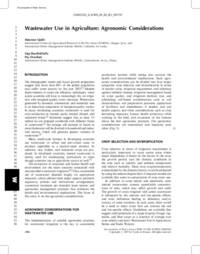Wastewater Use in Agriculture: Agronomic Considerations

Authors:
Under water scarce conditions and in the absence of alternative sources, wastewater generated by domestic, commercial, and industrial sectors is used worldwide to irrigate a range of crops. The sustainable use of wastewater is subject to reducing public health and environment risks, and applying appropriate agronomic practices, which can be divided into four major categories: (1) crop selection and diversification, (2) irrigation water management, (3) soil-based interventions, and (4) other considerations for health risk reduction. The agronomic interventions are interrelated and implicate each other. The awareness of farmers about the best agronomic practices is essential in sustainable wastewater irrigation.
